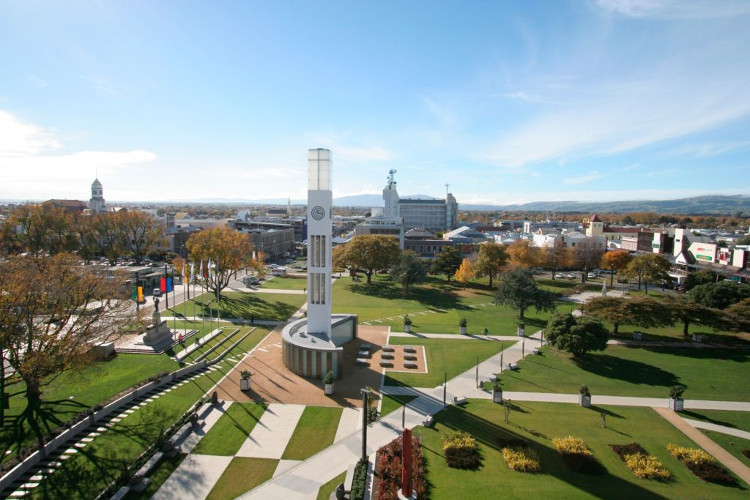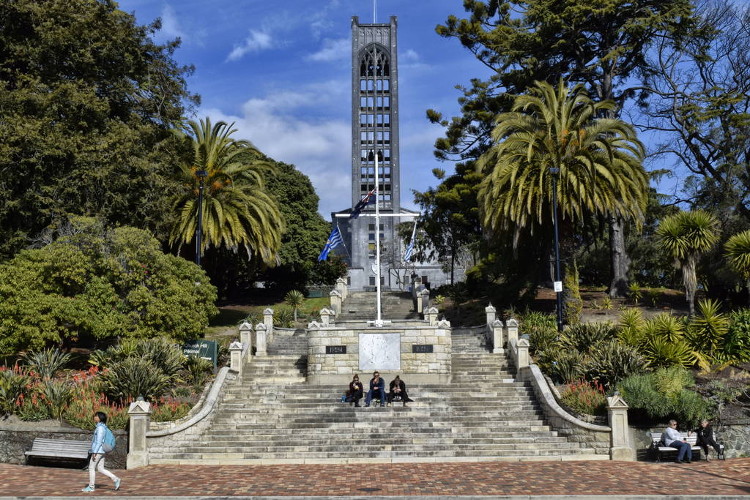
Study in New Zealand
New Zealand is a unique country, with gorgeous scenery and excellent study opportunities. It’s a safe and welcoming community with a world-class reputation for cutting-edge research and creative energy. These elements make the country an attractive destination for international students.
Why Study in New Zealand?
New Zealand has several types of higher education institutions: universities, colleges, private institutions and polytechnics. There are 8 universities in New Zealand, which all offer high quality education. All 8 of these universities are ranked within the QS World University Ranking top 500. The highest ranked is the University of Auckland, which is in 82nd place, followed by the University of Otago in 151st place.
One great advantage to studying in New Zealand is the unique approach to education. Students are encouraged to think as an individual and find their own solutions, which is how many develop unique strengths and ideas whilst studying in the country.
You are able to study in New Zealand at all of the traditional levels; undergraduate (bachelor’s), postgraduate (master’s) and doctoral (PhD). There are options to gain specific qualifications, such as Graduate Diplomas and Honours. These types of study generally last one year.
About New Zealand:
New Zealand is an island country located in the Pacific Ocean. The country mainly comprises of two islands. These are the North Island and South Island, although there are numerous smaller islands. The closest countries to New Zealand are Australia and the Pacific island nations: Fiji, New Caledonia and Tonga.
Made internationally famous through the Lord of the Rings film series, the beautiful scenery of New Zealand is varied thanks to ancient volcanic eruptions. New Zealand offers a rich mix of various cultures, including Maori, Pakeha (people of European descent), Asian and Pacific populations.
It is a developed country and does well in national performance rankings. These rankings consider all aspects, including quality of life, health, education and economic freedom. The most dominant sector of the national economy is the service sector, followed by the industrial sector.
The top tourist attractions in New Zealand include:
- Coromandel Peninsula
- Abel Tasman National Park
- Sky Tower (Auckland)
- Napier Art Deco
- Kaikoura
Cost of Studying & Living in New Zealand:
New Zealand uses the New Zealand Dollar ($NZD) as their currency.
Institutions in New Zealand are permitted to set their own tuition fees. This means that what you pay will be different depending on your institution of choice. International students can expect to pay between $22,000 and $32,000 for a bachelor’s degree, and between $26,000 and $37,000 for a postgraduate course. However, if you choose a course such as medicine, engineering or veterinary science, your fees are likely to be higher. All PhD students pay the same, which is $6,500 to $9,000 per year. For information about the cost of your specific course, contact your institution.
There are scholarships available for international students at all levels, including students wanting to gain a PhD. These scholarships are offered by the institutions themselves, or the government. Contact your institution to get more information about your eligibility, or use the official New Zealand scholarship directory.
Living costs depend on where you choose to live in New Zealand. As in most countries, the bigger cities will require a larger living budget than the smaller cities and towns. It is recommended that you allow between $15,000-$27,000 per year. If you will be studying in New Zealand for more than one year, you will be required to prove that you have at least $15,000 to support yourself for the first year. If you are studying for up to a year, you are required to prove that you have at least $1,250 for each month of study.
If you have a student visa, you are able to work up to 20 hours per week during term time, and full time out of term time. Students completing Masters by Research or PhD are able to work full time throughout their studies, including term time.
In order to study in New Zealand, you might have to purchase health insurance. This will depend on where you are from. If you hold a student visa, you are not eligible for publicly funded health services. The exception to this rule are students from Australia and the United Kingdom or PhD students. These students are entitled to publicly funded health care for immediately necessary treatment only. If you are from any other country, or need to access further medical treatment, you will need to make sure that you have valid medical and travel insurance throughout your stay. Your chosen institution will be able to provide more information regarding this.
Visas:
If you will be staying in New Zealand for more than 3 months, you may need to apply for a student visa. Students from Australia or other countries that have an agreement with New Zealand do not need to apply for a visa.
Once you have your visa, you can stay in the country for up to four years and have permission to work up to 20 hours per week. You must be enrolled with an approved institution and have the money to pay for your course.
You can either apply for your visa at your home country’s New Zealand embassy or consulate, but the application fee is 10% cheaper online.
For more information about visas, please visit the New Zealand Immigration website.
Language
There are three official languages in New Zealand; English, Maori and New Zealand Sign Language (NZSL). Te Reo Maori became an official language in 1987. NZSL, the main language of the deaf community in New Zealand, became an official language in 2006.
With only 3.7% of the population speaking Maori, the language is in danger of extinction. Authorities are working to make sure this doesn’t happen, implementing Maori classes in schools, as well as television channels broadcasting exclusively in Maori. Studying in New Zealand would be a fantastic opportunity to immerse yourself in a historic culture, picking up some Maori language and NZSL.
The majority of courses are offered in English. If your native language is not English, you may have to prove that your English skills will meet the teaching standards. If you do not, it is common for institutions to offer language programmes to improve your skills. Contact your institution if you want more information about this.
Why New Zealand:
New Zealand, although it is the same size as Japan or Great Britain, but there are a lot of reasons that you should consider going there for your studies abroad. Many people will call natives of the country “Kiwis,” after the bird that only resides there and nowhere else in the entire world. There are a number of reasons that you should consider studying in New Zealand instead of considering other countries; that’s what we’re going to look at in this section of our website.
1. The people:
Kiwis are some of the most amazing, loving, and welcoming people that you will ever meet. If you are a stranger, a native New Zealander is going to treat you like you are a friend. They are used to meeting new people, first because they travel a lot themselves, and also because a lot of people come to visit New Zealand as well. The culture on the islands is quite laid back and easy going, as well. So you’re not going to feel tense like you would if you went to a large city like London or New York City to study. There are just over 4 million people who reside on the country, and it is one of the safest places to live in the world. Another cool thing about the people is that there are so many different kinds of people. For being such a small country, the diversity is greater than you see in many European countries.
2. The stability:
Some people say that, because the country is in a small corner of the world that doesn’t really get bothered by anyone, that New Zealand seems to be secluded from the rest of the world. This isn’t true at all. As mentioned above, the people are really welcoming to outsiders. But, it can also be a great thing! The economy is actually incredibly stable, the cost of living is low, and the government is more stable (and less argumentative) than the governments that you will see in other countries. This is probably the reason that immigration is embraced, which we will talk about more in some of our later points.
3. The Weather:
Nothing can get better than the weather in New Zealand. The winters are mild, with temperatures around 10ºC (50ºF) and slightly wet. In higher altitudes, you will see snow, but it’s not common in lower altitudes. In the summers, the climate is warm and dry with temperatures around 25ºC (77ºF). As you would expect in the southern hemisphere, the summer lasts from December to February; winter lasts from June to August. Spring and fall are similar, with cooler temperatures and little rain.
4. The educational system:
This is the number one reason to go anywhere for school, but New Zealand is amazing for their educational system. First, the tuition is some of the lowest in the world. You get a British-based education (due to their British influences) for a percentage of the cost. The degrees are recognized around the world as being up-to-date and practical. You will get a high quality, hands on education that you deserve. The New Zealand even goes so far as to checking each and every course, program, and certificate for quality so that they can be recognized around the world as high-quality education. Not only that, but the support services for international students are among the best in the world. They have a lot of expertise and experience in helping international students so that they can succeed in their programs.
5. Never run out of things to do
This is an amazing opportunity for anyone who looks for adventure. In New Zealand, there are literally thousands of things to do. Do you like to hike? There are plenty of mountains for you to explore. Do you enjoy being a beach bum? Then you get to enjoy the beaches throughout the year. Want some excitement? There are always new things to do . The scenery is different depending on where you go; you could drive an hour and have a completely different geography. We’ll look at this more in our sports and recreation section.
6. Work opportunities:
There are plenty of work opportunities available for international students. On a student visa, you are allowed to work up to 20 hours a week through the semester; during vacations you can work up to 40 hours. So, instead of having to worry about finances, you get to supplement your education with income. You may even be able to nab internships and other practical work. The international studies office at your university can help you find a job to sustain you during your time in New Zealand. Another great thing is that you can get a permit at the end of your degree program and work for 12 months in the country under a special “work permit” that is alongside your student visa, which is what we’ll look at closer in the last point.
7. Ease of visa acquisition and residency:
The visa acquisition process is incredibly simple, and unlike many other countries, you will not be rejected right away. You get to talk to people and tell them your side of the story if there is something that may prevent you from getting a visa to come into the country. If you can explain why you’ve decided to go down there and your international studies program helps you to create a Statement of Purpose (a statement you give to the visa officer to tell them why you are coming to New Zealand to study), you will usually get a visa. The country is welcome to immigration, more so than almost any other country in the world. The last advantage is that, after you graduate, as mentioned above, you can work in the country for up to a year. If the job you are working at is related to the degree that you received, you can actually apply to get permanent residency, which you will most likely get within 6 months of your application. We look at visa acquisition and residency more in our Visa and Passport section.
Now do you see why there are over 100,000 people who go and study in New Zealand every single year? Will you join them and become an honorary Kiwi while getting your education in a beautiful and unique country like New Zealand? Then keep looking around our site; we can help you determine how to move forward with the application process and how to choose the right school for you. We want to give you everything that you need in order to help you to make the best decision on this site.







